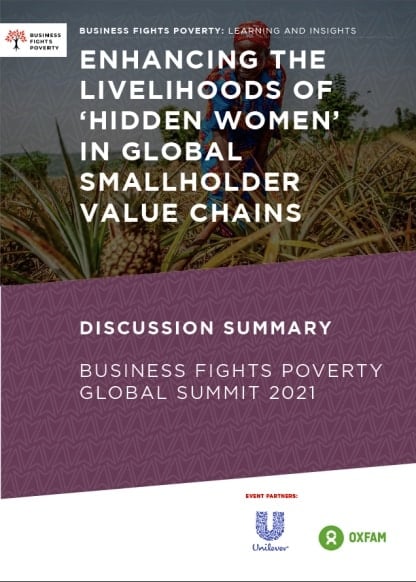Over a quarter of the world’s population make a living farming and working on small areas of land. Nearly half are women, who make crucial contributions to food security, livelihoods and global value chains.
As a group, smallholder farmers remain among the world’s most vulnerable populations, facing precarious livelihoods and a disproportionate level of risk arising from global threats ranging from market volatility to climate change, with no safety nets.
Compared with their male counterparts, women farmers face additional, complex social and economic barriers because of discriminatory gender norms that operate at many levels. Although women own less than 20% of the world’s land,[1] women are thought to be responsible for 60- 80% of food production in non-industrialised countries.[2]
Despite their significant contribution, women’s roles in smallholder value chains often go unrecognised, undervalued, and underpaid by society, by the economy, and in political decision-making; and women can be neglected or even adversely affected by smallholder support initiatives.
and underpaid by society, by the economy, and in political decision-making; and women can be neglected or even adversely affected by smallholder support initiatives.
For these reasons, Unilever and Oxfam co-hosted an online discussion with Business Fights Poverty at our Global Summit 2021 in which expert panellists shared learning and best practices on how companies can enhance the livelihoods of hidden women in their global value chains.
Our Discussion Summary Paper synthesises the rich insights from the conversation. It highlights some of the main challenges to enhancing the livelihoods of ‘hidden women’ in global value chains – including access to physical and economic assets, sociocultural norms, and lack of time and social capital. Above all, enhancing women’s livelihoods will require systemic changes. As Leena Camadoo, Global Advisor – Women’s Economic Justice, Oxfam GB commented during the online discussion, “Too often, ‘women’s empowerment’ is framed as a ‘women’s issue’. When in fact, we need to see a holistic change where other actors also change their behaviour to remove the barriers that women face.”
The paper then explores some of the levers of transformational change, providing insights into what practical action is already underway, and what can be learned from existing initiatives. Case studies of Marcatus Project, Ethical Tea Partnership, Oxfam Ghana, Symrise and Farmer’s Voice Radio highlight the impact of various interventions, from gender-mainstreaming, access to loans and savings, taking a bottom-up approach that centres the voices of women themselves, and embracing digital tools. You can also read reflections on how to design collaborative partnerships that better enable women to benefit within smallholder value chains, and build sustainable, resilient livelihoods.
In the words of Ilaria Ida, Global Senior Manager Sustainable Sourcing – Livelihoods and Partnerships, Unilever, to shift the needle “we need collaboration, collaboration and more collaboration. Cross-sector collaboration especially is a huge lever of change. It unlocks win-win-win situations.”
It is our hope that this paper will help companies and their partners address the deep inequalities in their supply chains that perpetuate poverty, as well as help recognise, value, and enhance the contributions of the hidden women on whom our global food supply systems depend.
You can download the report here. And join us this week at the Business Fights Poverty Global Goals Summit, to find out more about how business is supporting agricultural transformation and ensuring that women in supply chains are not left behind in the transition to the net zero economy. Register with promo code BFPSDGS21 to get your all-access pass completely free of charge.
[1] Villa, M. (January 2017) Women own less than 20% of the world’s land. It’s time to give them equal property rights.
[2] GRAIN (2014) Hungry for land: small farmers feed the world with less than a quarter of all farmland










